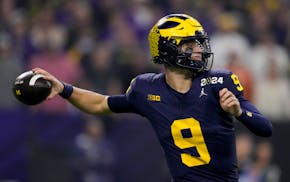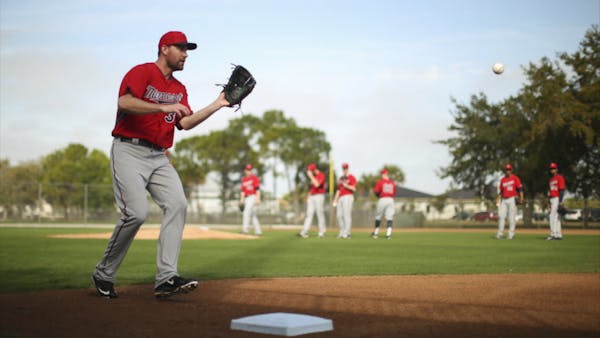Fort Myers, Fla. – Torii Hunter is sitting in the back-left corner of the Twins' spring training complex, in the space he once inherited from Kirby Puckett. Eddie Guardado grabs a chair and they talk about Kevin Garnett, as Byron Buxton listens from two lockers away.
It could have been 2001, but then Buxton would have been 8 years old.
As Buxton pulled a shirt over his v-shaped torso, Hunter wagged a finger. "You got all you need physically," Hunter says. "I'm going to give you everything else. I'm going to be in your ear and in your head. You can't listen to everybody. That's a mistake I made. But you better listen to me. We're going to write out a contract, and you're going to sign it, and we're going to go to work."
"I am all for that," Buxton says.
The same week Garnett was re-introduced to the Timberwolves, Hunter reintroduced his voice and aura to the Twins. They've shared the same sports page before. When they were in their prime, they'd run into each other at Bellanotte, the former NBA hangout across from Target Center.
"When he came to Twins games at the Metrodome, we always displayed mutual respect," Hunter said. "I'd see him at restaurants — at Bellanotte — and we'd eat and talk. When he went to Boston, and I was in L.A., I went to the Finals games. He won, and I was like, 'I've got to get me a ring like that.' Of course, that never worked out.''
Hunter went to Los Angeles and Detroit hoping to win a title as a star player. He returns to Minnesota, like Garnett, as something of a player-coach. He began his mentoring of Buxton the moment he saw him.
Buxton, like a young Hunter, is a star football player from the South who became a first-round draft pick of the Twins. Between Hunter and Buxton this spring sits Aaron Hicks, another high school centerfielder drafted in the first round by the Twins.
"My first spring here, I sat next to Kirby and Dave Winfield, and they took care of me,'' Hunter said. "They wouldn't let me buy a meal. Those guys poured it into me, and I plan to pour that back into these guys, and someday they can pour it into somebody else. That's what it's about — being fruitful and giving it back. It's not my job. It's my character. It's who I am."
It's easy to say Hunter returned because of the Twins' past. He argues that his past informs the Twins' future.
"I have information," he said. "I've been through a lot of failures and I had to climb up and break my way through those, and that's what I have given to younger guys. It took me a long time to succeed. It was my fault. I listened to too many people. I didn't want to be uncoachable, so I listened and stopped using my God-given abilities. I finally said, 'See ball, hit ball,' and my career went crazy."
Hunter remembered playing on losing Twins teams in the late '90s and 2000. He remembers the feeling in the clubhouse before the 2002 season, when the Twins were threatened with contraction yet made it to the ALCS.
"Me and Doug Mientkiewicz and Jacque and David Ortiz would sit over in that corner and say, 'This might be the last time we get to play together,' " Hunter said. "We'd say, 'We want to prove we're not the best Triple-A team in baseball, we're the best team in baseball.' We played as a team. You couldn't say anything to one of our guys, even if our guy was wrong, or you'd have all of us on you.
"We played together. We went out to dinner together. We brawled together. Last year, I saw that fire in the Twins. That's one of the reasons I'm back. They're trying to win here, and I want to be a piece of that."

Souhan: Wolves fans made Game 1 special. Now bring on Game 2.

Souhan: Should Vikings even consider McCarthy in NFL draft?

Souhan: NAW erases Suns' lead, Game 1 advantage with big performance

Souhan: This is KAT's chance to prove Flip Saunders was right


